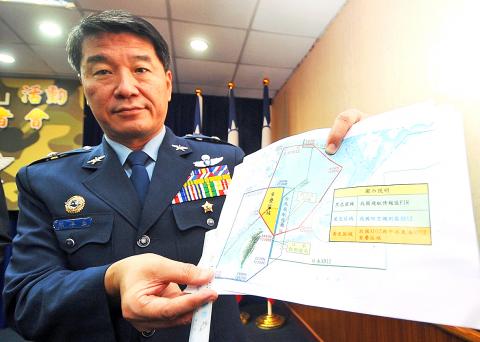Two Chinese surveillance aircraft intruded into Taiwan’s air defense identification zone (ADIZ) four times on Monday and were intercepted by Taiwanese fighter jets and escorted out of the zone each time, a senior air force official said yesterday.
In each incident, a single Y-8 electronic surveillance plane flew through the southwestern corner of Taiwan’s defensive zone, where its position was identified by the Republic of China (ROC) Air Force, Air Force Combat Command Chief of Staff Major General Hsiung Hou-chi (熊厚基) said.
Two of the intrusions occurred in the morning on one sortie, when a Y-8 aircraft flew through the zone as it headed toward the Philippines and then flew back through the zone as it returned to China, Hsiung said.

Photo: Fang Pin-chao, Taipei Times
The pattern then repeated itself in the afternoon with a different plane.
Each intrusion lasted about 10 minutes, and they all occurred at altitudes of about 6,700m, he said.
They were the first intrusions into Taiwan’s air defense zone this month by aircraft from another country, he said.
Mirage 2000 fighter jets were dispatched to intercept the Chinese aircraft in the morning and maintained visual contact until it left the zone, while Taiwan’s Indigenous Defense Fighter jets were used in the afternoon intercepts, Hsiung said.
“We followed them closely to make sure they left our ADIZ,” Hsiung said.
He declined to disclose the number of fighter jets scrambled for the intercepts.
The ADIZ is an indication of national sovereignty and Taiwan’s military has an obligation to deal with any contingency involving the intrusion of foreign aircraft, he said.
The Chinese-language United Daily News cited an unidentified military officer as saying that Chinese aircraft had detoured in the past to avoid entering Taiwan’s ADIZ.
By entering the air defense zone this time, the Chinese air force could test Taiwan’s air surveillance capabilities and its reaction to intruders, the officer said.
Calling the action of the Chinese surveillance aircraft provocative, Democratic Progressive Party Legislator Chen Chi-mai (陳其邁) yesterday said that if the government does not protest to Beijing over the matter, China in the future may further overstep the line and threaten Taiwan’s national defense.
The Chinese Ministry of Defense did not immediately respond to a request for comment.
The incident came amid speculation that China may set up an ADIZ in the South China Sea to assert its territorial claims.
Last year, it declared an ADIZ in the East China Sea that included islands also claimed by Taiwan and Japan.
Additional reporting by Chou Ssu-yu, AFP and Reuters

Seventy percent of middle and elementary schools now conduct English classes entirely in English, the Ministry of Education said, as it encourages schools nationwide to adopt this practice Minister of Education (MOE) Cheng Ying-yao (鄭英耀) is scheduled to present a report on the government’s bilingual education policy to the Legislative Yuan’s Education and Culture Committee today. The report would outline strategies aimed at expanding access to education, reducing regional disparities and improving talent cultivation. Implementation of bilingual education policies has varied across local governments, occasionally drawing public criticism. For example, some schools have required teachers of non-English subjects to pass English proficiency

‘FORM OF PROTEST’: The German Institute Taipei said it was ‘shocked’ to see Nazi symbolism used in connection with political aims as it condemned the incident Sung Chien-liang (宋建樑), who led efforts to recall Democratic Progressive Party (DPP) Legislator Lee Kun-cheng (李坤城), was released on bail of NT$80,000 yesterday amid an outcry over a Nazi armband he wore to questioning the night before. Sung arrived at the New Taipei City District Prosecutors’ Office for questioning in a recall petition forgery case on Tuesday night wearing a red armband bearing a swastika, carrying a copy of Adolf Hitler’s Mein Kampf and giving a Nazi salute. Sung left the building at 1:15am without the armband and apparently covering the book with a coat. This is a serious international scandal and Chinese

TRADE: The premier pledged safeguards on ‘Made in Taiwan’ labeling, anti-dumping measures and stricter export controls to strengthen its position in trade talks Products labeled “made in Taiwan” must be genuinely made in Taiwan, Premier Cho Jung-tai (卓榮泰) said yesterday, vowing to enforce strict safeguards against “origin laundering” and initiate anti-dumping investigations to prevent China dumping its products in Taiwan. Cho made the remarks in a discussion session with representatives from industries in Kaohsiung. In response to the US government’s recent announcement of “reciprocal” tariffs on its trading partners, President William Lai (賴清德) and Cho last week began a series of consultations with industry leaders nationwide to gather feedback and address concerns. Taiwanese and US officials held a videoconference on Friday evening to discuss the

PERSONAL DATA: The implicated KMT members allegedly compiled their petitions by copying names from party lists without the consent of the people concerned Judicial authorities searched six locations yesterday and questioned six people, including one elderly Chinese Nationalist Party (KMT) member and five KMT Youth League associates, about alleged signature forgery and fraud relating to their recall efforts against two Democratic Progressive Party (DPP) legislators. After launching a probe into alleged signature forgery and related fraud in the KMT’s recall effort, prosecutors received a number of complaints, including about one petition that had 1,748 signatures of voters whose family members said they had already passed away, and also voters who said they did not approve the use of their name, Taipei Deputy Chief Prosecutor